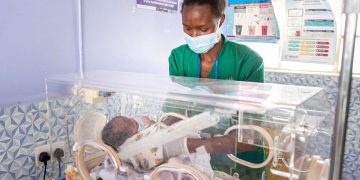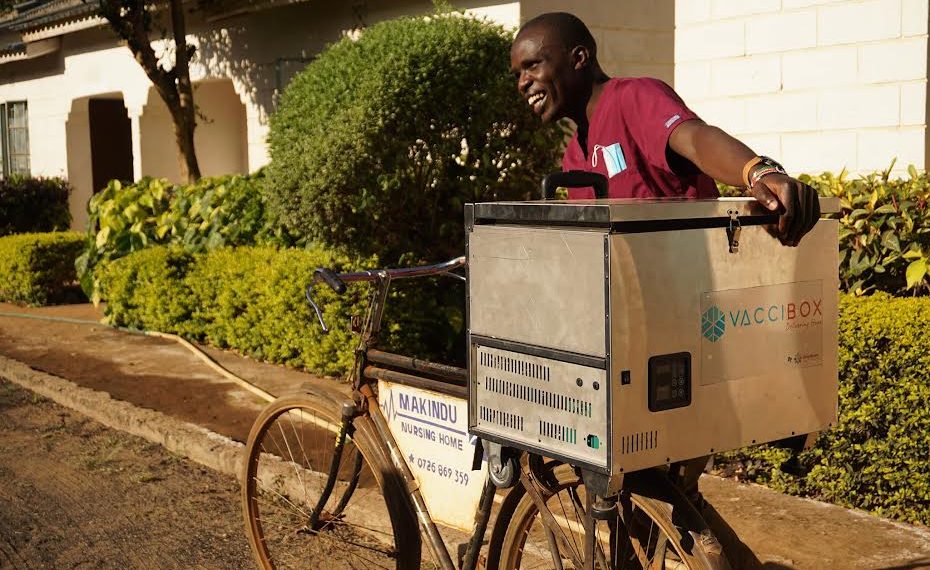In an attempt to address challenges of vaccine access in rural communities, Vaccibox-an innovative medical refrigerator-is transforming vaccine and cold chain storage and transportation challenges in underserved population in remote parts of rural Kenya in what many healthcare workers believe to be a game-changer.
Kenya is a signatory to the Addis declaration on immunization that required countries to attain Universal Access to Immunization, however, cold chain gaps still exist in healthcare facilities in Kenya, especially in the rural hindering access.
Some health facilities do not have grid power, while others have unreliable power and need to use alternative sources of energy such as Solar. Some health facilities simply do not have a working vaccine refrigerator and therefore cannot store vaccines.
Vaccibox developed by Norah Magero and James Mulatya, co-founders of Drop Access, is a portable solution that is revolutionizing the delivery and storage of vaccines, ultimately improving healthcare outcomes in underserved regions.
After moving from Nairobi to her rural home, Norah Magero, co-founder and CEO of Vaccibox, experienced firsthand the challenges of accessing vital healthcare services, particularly vaccinations, for her newborn child.
When Norah relocated to her rural home, scarcity of vaccines and the logistical hurdles involved in ensuring that vaccines reach healthcare facilities in the rural areas became painfully apparent.
This is when she noticed that something had to be done and determined to make a difference, Magero, alongside her co-founder James Mulatya, embarked on a mission to revolutionize medical access in Africa.
The team realized the need to design a portable solution available for different modes of transportation that can keep items in cold storage while in motion.
“One of the challenges of cold storage infrastructure is electricity. Access to electricity is still a problem for many African countries,” Mulatya says.
He adds that when they embarked on the mission of designing Vaccibox we realized that most rural health facilities used vaccine carriers with ice packs to transport vaccines.
However, transporting vaccines in icebox comes with its challenge because it is difficult to monitor the temperature and also could not keep the vaccines cold for long enough, especially when carrying out outreaches in the community.
“Cold boxes are not refrigerators, and sometimes the temperature can fall outside the desired range and there is no way of monitoring them, rendering them unsafe.”
According to Mulatya cold chain gaps still exist in healthcare facilities in Kenya, especially in the rural area. Some health facilities do not have grid power, while others have unreliable power and need to use alternative sources of energy such as Solar.
“A reliable cold chain is still required in all health facilities for vaccines such as child-based vaccines and also for medications such as oxytocin,” James said.
Cold chain infrastructure is particularly important for vaccine distribution, too high or too low temperatures result in a loss of vaccine potency which cannot be regained or restored.
In addition, Vaccibox utilizes solar power, an abundant renewable resource in Kenya.
According to Mulatya, the Vaccibox team engaged health workers to identify their pain points and reliable cold storage was among the major issues.
Health workers expressed that they needed something that would enable them to transport vaccines easily.
He explains that Vaccibox was therefore designed with the aim of addressing existing challenges as expressed by the users -healthcare workers for the last mile vaccine delivery and storage.
With VacciBox, they can now transport vaccines to the immunization grounds without the worry of spoilage Mulatya explains adding that, “Vaccibox can be used for other medications that require to be refrigerated, such as insulin and oxytocin. It can also be used for animal vaccines as they also require refrigeration.”
VacciBox specifications
According to Mulatya, Vaccibox has an internal capacity of 50 liters, adequate for a level 3 and below facility to store and/or transport about 3000 doses of vaccines.
Vaccibox can operate for 36 hours on a full charge of the battery before it needs to be connected to the solar panel. It can also be connected to grid/AC power enabling it to run throughout.
Besides vaccine vials, the Vaccibox is designed to transport and store blood, and other medications. It is lightweight and very easy to use thanks to its innovative Cool Skin cold delivery technology, it can be easily carried wherever you need it.
Vaccibox’s temperature is monitored and controlled automatically without requiring any inputs from the user. This ensures that the recommended temperature range is always maintained and an inaccurate temperature setting cannot be accidentally set by the user.
“We also utilize high-quality insulation in the making of the fridges which prevents heat gain from the external environment therefore maintaining the “cool” temperature inside the fridge.”
With solar panels on the lid, one can mount the box on a motorcycle, bike or boat for transport while the panels harness solar power along the journey.
The Vaccibox unit is designed with simplicity in mind. The user only needs to know how to connect the charging plug from the solar panel or AC power, how to power it on and off, and other basic procedures for handling during transportation and cleaning. All other functions are done automatically.
We provide training to the users when supplying the units as well as technical support through the ownership period.
Success of the project
So far, the company has piloted the product in two hospitals: Usungu Dispensary in Kibwezi West Sub-County, Makueni County, which is located 22km away from any electric grid, and Merrueshi Village Health Centre in Maasai Simba Camp and Conservancy, which focuses on maternity and newborn care.
Mulatya explains that Vaccibox has improved access to health services in those facilities.
“Vaccibox has enabled several rural health facilities to get vital medical products and vaccination services to the communities they serve.”
According to Rachael Munyau, a nurse at Merrueshi Health Centre in Kajiado a remote village in Kenya, in the past, she says that she had to use other methods – like a cooler box filled with ice – to take vaccines to remote villages.
With VacciBox, she says that she can now transport vaccines to the immunization grounds without the worry of spoilage.
This has led to safe deliveries, reduced maternal mortality rates, increased immunization rates for children under 5 years of age and ultimately improved health due to reduced occurrence of vaccine-preventable diseases.
“Vaccibox is a reliable cold chain storage required in all off grid health facilities for safe delivery of vaccines such as child-based vaccines and also for medications such as oxytocin,” she said.
“Communities that previously did not have access to vaccines now have access as health workers can now reach them during outreach programs.”
In Usungu dispensary VacciBox has enabled the dispensary to store more than 1,000 vaccines onsite, initially, the health facility ran biweekly vaccine transports to the dispensary and returned the supplies to the county hospital at the end of the day.
Through support from the Solar Energy Foundation, Kenya has purchased five Vaccibox mobile solar refrigerators and had them installed by Drop Access in these health stations, Isinya Sub-County Hospital – Kajiado County, Ngatu Dispensary – Kajiado County, Osarai Dispensary – Kajiado County, Kiloh Dispensary – Kajiado County, Ivoleni Dispensary – Makueni County.
In Isinya health centre in Kajiado County, the 50-liter VacciBox refrigerator is making difference in two main ways first, the 60-70 deliveries per month, and second, the number of vaccinations. According to Amos a clinical officer at the facility, the Vaccibox allows over 500 children per month access to important vaccinations.
“One advantage of the VacciBox is its mobility: it can easily be used for outdoor operations its refrigerator is able to maintain the desired temperature range of 2 to 8 degrees Celsius. ”
Victor Kiprotich who has managed Kiloh dispensary since 2019, an off-grid health clinic in rural Kenya, located about 150km South West of Nairobi that serves a Maasai community of nearly 3,000 people who live scattered within a 15 km radius of the dispensary, said that Vaccibox has really helped them in storing vaccines and doing outreach programs.
He says, “The first positive impact of Vaccibox is vaccine storage. Since we are not connected to the power grid, our only storage for medicines has been a fuel-powered refrigerator,” he adds that “apart from the high cost of operating a refrigerator, fuel supply is very unreliable, especially in remote clinics like Kiloh. It is not uncommon to go several weeks without fuel to run the refrigerator.”
The result: a huge loss in medicines that are no longer refrigerated and a serious disruption in medical care.
“The solar-powered VacciBox has completely solved the problem of medical and vaccines storage” notes Victor. Energy efficient refrigerated vaccine carriers like Vaccibox is therefore considered essential to decreasing waste.
According to Mulatya “Vaccibox retails for USD 2,000. We also offer leasing options for Vaccibox.,” he adds that “They are affordable considering that other vaccine refrigerators of similar size can go for upwards of USD 6,000 and do not include remote monitoring technology.”
The vaccine cold chain gap in Kenya as well as in other African countries still needs some intervention to ensure vaccine equity. There is a long way to go to meet the energy and healthcare access gaps and Vaccibox will continue to play a role in this effort.
Drop Access is also constantly engaged in research and development to ensure that improvements on Vaccibox are made and the technology remains relevant in terms of meeting the cold chain gaps in Africa.
“Winning the Africa Prize for Engineering Innovation by the Royal Academy of Engineering was both a humbling and exhilarating moment for the Drop Access team. It was such an honor to be selected as the winners because all the finalists in the competition were innovating great solutions across Africa,” Mulatya said.
The award gave us the confidence to continue on our entrepreneurship journey, financial support for further product development and much needed exposure that led to us meeting other partners and clients.
One of the major challenge is that Vaccibox is yet to be prequalified by the WHO as a vaccine cold storage device. The company is currently in the process of acquiring the WHO prequalification.
“The WHO prequalification will enable us to sell Vaccibox worldwide,” James said.
Mulatya is optimistic with the future of the technology saying “Vaccibox is here to stay. The vaccine cold chain gap in Kenya as well as in other African countries still needs some intervention to ensure vaccine equity. There is a long way to go to meet the energy and healthcare access gaps and Vaccibox will continue to play a role in this effort.”














